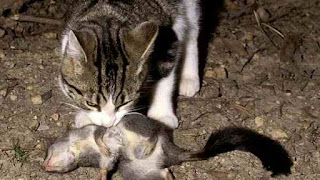Cats are cuddly pets, but if they get into the wild they can cause native animals to become extinct. This has been the case in Australia. They hunt little marsupials until there are none left to eat then move on to consume something else. growing larger in the wild certainly help cats to survive very well indeed.
Where did the cats originally come from? It was thought that Asia was the most likely place as Asian fishermen came to Australia's northern shores well before Europeans. However, research shows that they did come on boats from European countries whether as "stowaways" or more likely brought as pets to remind new arrivals of home. Moreover, having cats to hunt rodents on European ships was common in the early 1800s.
Island cats were tested as they had not crossed with new cats imported from countries across the world, so the findings were accurate and Europeans are the culprits for spreading this pest. Keep your cat in the house and don't let it roam. "Darn! Gone again."
◆ Genetics by Ty Buchanan ◆
Australian Blog
●
. . . . . . . . . . . . . . . . . . . . . . . . . . . . . . . . . .
PEST CATS
#wild #cats #pest #Australian #kill #hunt #marsupials #extinction #demise #domestic
PEST CATS
#wild #cats #pest #Australian #kill #hunt #marsupials #extinction #demise #domestic
cats europe brought here to australia pest extinct rare small marsupials articles news politics economics society anthropology historiography history sociology people nations country asia europe africa u.s. south america central Mediterranean eastern western interesting funny technology free







